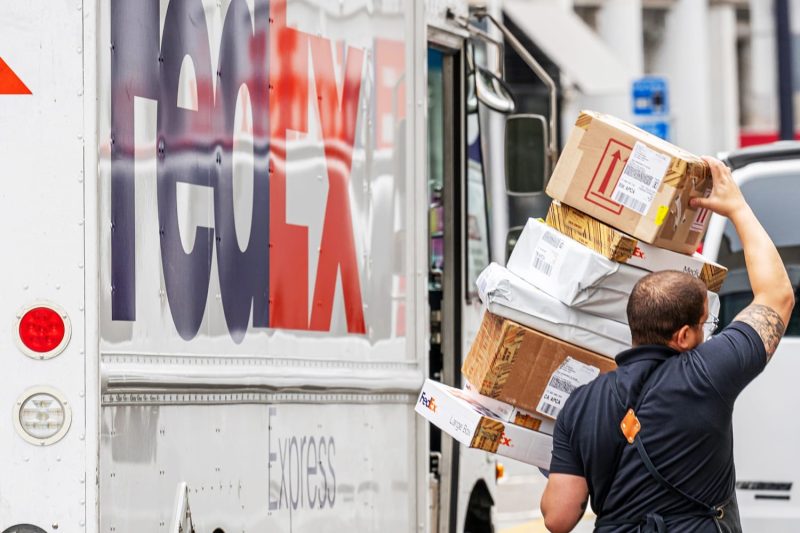Consumer need for speed in package delivery, which has reached its apex with same-day shipping, has placed retailers in a tough spot when it comes to managing transportation costs. The result is increased competition among shippers for retail volume in a market dominated by FedEx and UPS, according to a new survey from global consulting firm AlixPartners.
Retail executives surveyed say as more — especially younger — consumers demand same-day delivery, the financial payoff isn’t there.
Roughly three-quarters (76%) of retail executives surveyed by AlixPartners said delivery cost on a per-package basis has increased since last year, and three out of four said home delivery does not add to profitability. An overwhelming majority (85%) said reducing their total cost per order is the No. 1 priority for last-mile delivery.
Shippers are facing their own cost pressures. “Carriers have experienced meaningful inflation in wages, equipment, repair and maintenance, insurance, fuel, tires, real estate, health-care costs, and more,” said Marc Iampieri, global co-leader of logistics & transportation, and partner & managing director of AlixPartners. “Those costs are offset by future rate increases. There is also a macro supply-and-demand equation to consider as e-commerce growth outstrips retail growth.”
Iampieri said the recent UPS-Teamsters contract renewal is a good example of wage inflation.
To save on delivery costs, retailers are moving away from reliance on single carriers in last-mile delivery. Three out of four executives reported they are using a mix of last-mile options. To date, the shift in shipping strategy has helped FedEx, but hurt UPS. FedEx was the primary last-mile carrier cited by 42% of executives, an increase of 15% year over year. But UPS saw a decrease in retailers using it as a sole last-mile carrier, dropping from 35% in 2023 to 25% in 2024.
UPS reported weaker-than-expected profits for Q2 this week and suffered its worst single-day stock loss on record.
UPS did not respond to a request for comment by press time.
In its earnings commentary on Tuesday, it cited customers “trading down,” moving to more economic options in the most recent quarter, but also indicated this was linked to the “acceleration of new entrants, new e-commerce customers” that were coming into the market, assumed to be a reference to Asian low-cost retailers and Amazon rivals Shein and Temu. UPS also noted that it lost customers year over year due to the Teamsters contract negotiations in 2023 and customers signing long-term contracts elsewhere.
Some alternative parcel delivery companies identified as benefitting from the move to diversify last-mile delivery include OnTrac, Pandion, and LSO/Lone Star Overnight. Additional delivery companies include Uber Eats and Uber Connect, Postmates, DoorDash, Instacart, and Shipt.
Free delivery is still the big draw for consumers, with 92% saying that factors into their buying decisions, but the consumer threshold of waiting for product delivery is 3.5 days maximum, or else they say they will shop elsewhere.
“They are addressing this by shifting customer policies with half increasing minimum order spend in the past year,” said Chris Considine, a partner at AlixPartners. “When minimum delivery expectations aren’t met, 25% of shoppers will spend elsewhere.”
Almost two-thirds (64%) of retail executives surveyed said they increased the minimum order value for free shipping; 15% said they are requiring a minimum order value and membership for free shipping. Among consumers, 25% surveyed said they preferred to Buy Online, Pick Up in Store (BOPIS) versus delivery to avoid any shipping costs and to receive the product faster.
“While this trend has traditionally been driven by convenience, continuing shifts in service level improvements, expanding options, assortment, and return to in-person working environments are also playing a role,” Considine said.
Most consumers surveyed (92%) said a delayed order would impact their future purchase decisions and 82% expected compensation, but only 4% of companies surveyed said they would offer a discount on the next purchase for a late delivery.
Considine characterized online buying fundamentals as strong, with e-commerce sales of cleaning products up the most year over year, at 11%, followed by grocery and health/medical supply, both up 10%. Footwear and apparel purchases increased to a lesser extent.
Recent data from Motive, which tracks trucking visits to North American distribution facilities for the top five retailers, shows freight volume was up 30% year-over-year in June.
To cut costs on returns, retailers have also changed free shipping qualifications.
“Retailers are tightening the return policies such as shortening or enforcing the return window of time and eliminating free returns just for convenience and requiring a stated defect or issue with the good/product,” Iampieri said.
When given the option of shipping the return or an in-store return, over 80% of consumers reported they were willing to travel between 15-30 minutes for free in-store returns versus paying a shipping fee.

